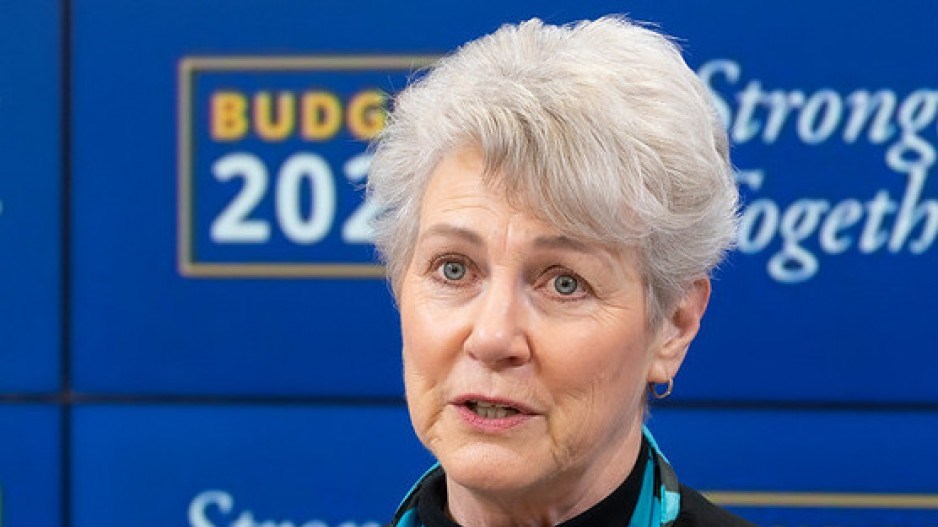The government of B.C. is investing $4.2 billion in funding, the largest three-year housing investment in provincial history, to support affordable housing, build rental supply and tackle homelessness, according to Budget 2023, released today, Feb. 28.
This funding is part of a refreshed housing plan that will be released in spring 2023 and builds on the program: Homes for B.C.: A 30-point Plan for Housing Affordability in British Columbia.
“We need to do more with the housing plan and that’s what this budget is going to do,” said Minister of Finance, Katrine Conroy, adding the more details surrounding how to build housing stock will be released alongside the spring 2023 plan.
This latest budget marks record investments in housing for the province with four times more operating funding per year for housing initiatives since 2017, according to the B.C. government.
Building badly needed housing stock
In order to continue this effort and build more supply, $1.7 billion over three years will be allocated towards building more homes through the BC Builds and Building BC Programs. This will include $380 million to unlock more homes as well as investments towards the Indigenous Housing Fund and the Community Housing Fund, according to Budget 2023.
This funding includes $394 million in order to help buy land for new affordable and market homes near transit corridors and $66 million in annual operating funds for the rapid construction of affordable homes.
In addition, a separate fund of $575 million has been committed to support the delivery of student housing across B.C.
Budget 2023 will also provide up to $11 million over the course of the fiscal plan in order to further the implementation of legislation like the Housing Supply Act, which was passed in Nov. 2022. This legislation will apply housing targets to certain municipalities as the province looks to build more supply.
Minister Conroy said that the $1 million set aside for municipal infrastructure, as part of the surplus, will work towards supporting the building of these housing targets.
In addition, $57 million over the course of the fiscal plan will go towards new residential zoning measures and reducing the red tape within the local government approval process, according to Budget 2023.
Separate from the $4.2 billion investment, the government will also be supporting BC Housing by increasing its debt facility by $839 million, which will bring the total debt facility to $3.6 billion.
Supporting B.C.’s rental market
In addition to building more homes, the province is making investments to support and protect renters, revitalize BC Housing’s aging rental stock and prevent eviction or homelessness.
Included in Budget 2023 is a Renters Tax Credit for moderate and low-income renters, in place of the renter’s rebate promised by the provincial government. Starting next year when 2023 income taxes are filed, these individuals can access a $400 a year income-tested renters tax credit.
Minister Conroy said that approximately 80 per cent of renters will qualify for this tax credit.
To add to the $500 million Rental Protection Fund, announced in Jan. 2023, $230 million in funding has been provided in order to revitalize and expand BC Housing’s aging rental stock. This is meant to preserve existing units while also adding new affordable purpose-built rentals.
Over $7 million has been earmarked for the BC Rent Bank that will provide renter financial support and prevent evictions. This is in addition to $15.6 million over the course of three years for the Residential Tenancy Branch to boost service delivery and decrease the time needed to resolve landlord and tenant disputes.
Finally, the Budget 2023 will be providing $91 million over three years for a new pilot project that will work to incentivize homeowners to develop secondary suites on existing properties for long-term rentals.
The province is also introducing a new property transfer tax in order to encourage the construction of new purpose built rental.
Reducing homelessness throughout the province
When it comes to urgent housing needs, the latest budget has allocated $1.5 billion of funding towards the effort to reduce homelessness. This will include funding for modular homes, complex care and encampment response measures.
New regional multi-disciplinary teams, to support rapid response to regions with encampments will receive $228 million of funding over three years. In addition, $44 million has been set aside to provide temporary modular housing as well as day-to-day and safety supports for those living in encampments.
Further funding of $440 million over three years has been set aside for the Supportive Housing Fund, $109 million for BC Housing programs that provide shelter and low-income assistance programs, and $182 million over three years to support and find permanent housing for those currently in temporary leased space as part of the government’s pandemic response.




